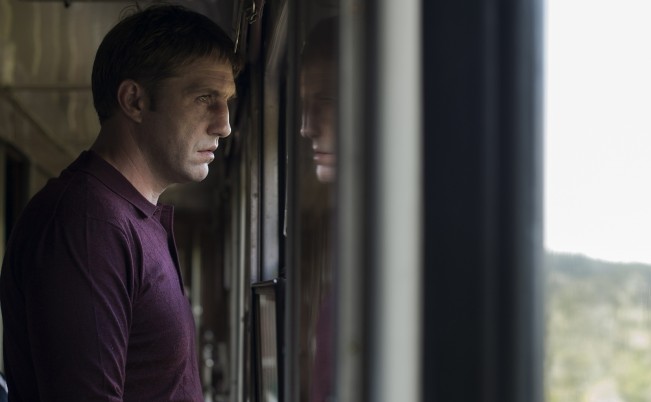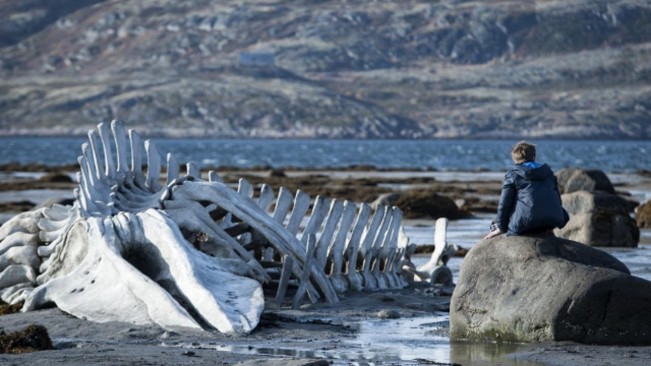By Jake Howell jake.howell@utoronto.ca
Cannes Competition Review: Leviathan
 “Canst thou draw out Leviathan with a fishhook? Or his tongue with a cord which thou lettest down?”
“Canst thou draw out Leviathan with a fishhook? Or his tongue with a cord which thou lettest down?”
—Job 41:1
Returning to the Palme d’Or race after a brief segue in Un Certain Regard (where 2011’s Elena won the Jury Prize), Andrey Zvyagintsev’s Leviathan is one of the finest, if not the finest film, in the 2014 Competition; other films may match it in terms of meaning, but the level of craftsmanship and the delicate form on display here is unrivaled. Described by its producer Alexander Rodnyansky as a “story of love and tragedy experienced by ordinary people,” Leviathan is one of the final titles here at Cannes 2014, and its utter immensity is proof that this Festival does indeed sometimes save the best for last.
The narrative—rapt in poignant beauty and steeped in true irony—is witnessed in the Euro-Arctic town of Kirovsk, a hilly, chilly locale exquisitely photographed by Mikhail Krichman, Zvyagintsev’s usual cinematographer. Penned by Zvyagintsev and regular writing partner Oleg Negin, the film was initially described as a contemporary retelling of the Book of Job (which certainly raised intrigue), but it’s simpler to dissect it as a story of one man’s Ahab-like struggle with broken family and municipal corruption. Set against the merciless Barents Sea, Kolya (Aleksey Serebryakov) faces the loss of his house and business due to the shady practices of Vadim Sergeyich, the vodka-swilling, red-faced Gargantuan mayor who resorts to threats and violence to remain in power (with flashes of a certain crack-using Toronto politician). Trying his best to stay afloat, Kolya employs the help of Moscow lawyer Dmitri (Vladimir Vdovichenkov) to navigate the legal situation, and it’s the trust he places in him that begins the collapse of everything, his family included, that Kolya knew (though outlooks are similarly bleak for most in this representation of Kirovsk).
As Leviathan is Zvyagintsev’s biggest production to date, the film weighs in with a populated cast that is uncharacteristic of the director’s previous work. While it is a trick at the top of the film to get a handle on all the names and family members amidst the exchanges, each character eventually receives the treatment that hints at a number of engrossing tales written into this diegesis; Zvyagintsev presents a universe that is established with sublime restraint, and the storytelling of the supporting players strikes a balance that adds to the emotional impact of Kolya’s situation, rather than distract from or muddle it.
 Speaking of Kolya: many reports out of this Festival have extolled Timothy Spall’s acting in Mr. Turner (myself included), but Aleksey Serebryakov owns, by far, the most compelling male role in this entire Competition. There’s never a scene where Kolya doesn’t have a myriad of issues weighing on his mind, and these are visible in Serebryakov’s pained, tired facial expressions and believable portrayal of alcoholism (to be sure, Leviathan is boozier than two or three Hong Sang-soo films combined). While the entire cast is assuredly great, we see a major range in Serebryakov’s exploration of Kolya, and it’s a deeply affecting performance.
Speaking of Kolya: many reports out of this Festival have extolled Timothy Spall’s acting in Mr. Turner (myself included), but Aleksey Serebryakov owns, by far, the most compelling male role in this entire Competition. There’s never a scene where Kolya doesn’t have a myriad of issues weighing on his mind, and these are visible in Serebryakov’s pained, tired facial expressions and believable portrayal of alcoholism (to be sure, Leviathan is boozier than two or three Hong Sang-soo films combined). While the entire cast is assuredly great, we see a major range in Serebryakov’s exploration of Kolya, and it’s a deeply affecting performance.
Finally, Zvyagintsev’s construction (and eventual deconstruction) of visual space is really quite astonishing. Both indoors and out Krichman employs dolly tracks that often follow a curved trajectory, allowing the camera to turn corners in domestic scenes or capture a wider shot of the imposing landscapes. At all times the film looks gorgeous, often haunting; whether it is the poetic image of a half-buried whale skeleton or the frigid hillsides of northwest Russia, there are scenes in this film that are simply incredible. One unforgettable example: tracking back-to-front the length of a courtroom during one of Kolya’s hearings, in a single take the camera slowly approaches a woman speed-reading legalese as fast as she can, done so to make a point about the confusing, whirlwind bureaucracy that laymen like Kolya have no chance in besting. It’s this kind of artistry that makes Leviathan such a giant: modest, accessible, yet deeply complex and expertly accomplished.

















You betcha! http://www.hollywood-elsewhere.com/2014/05/48301/